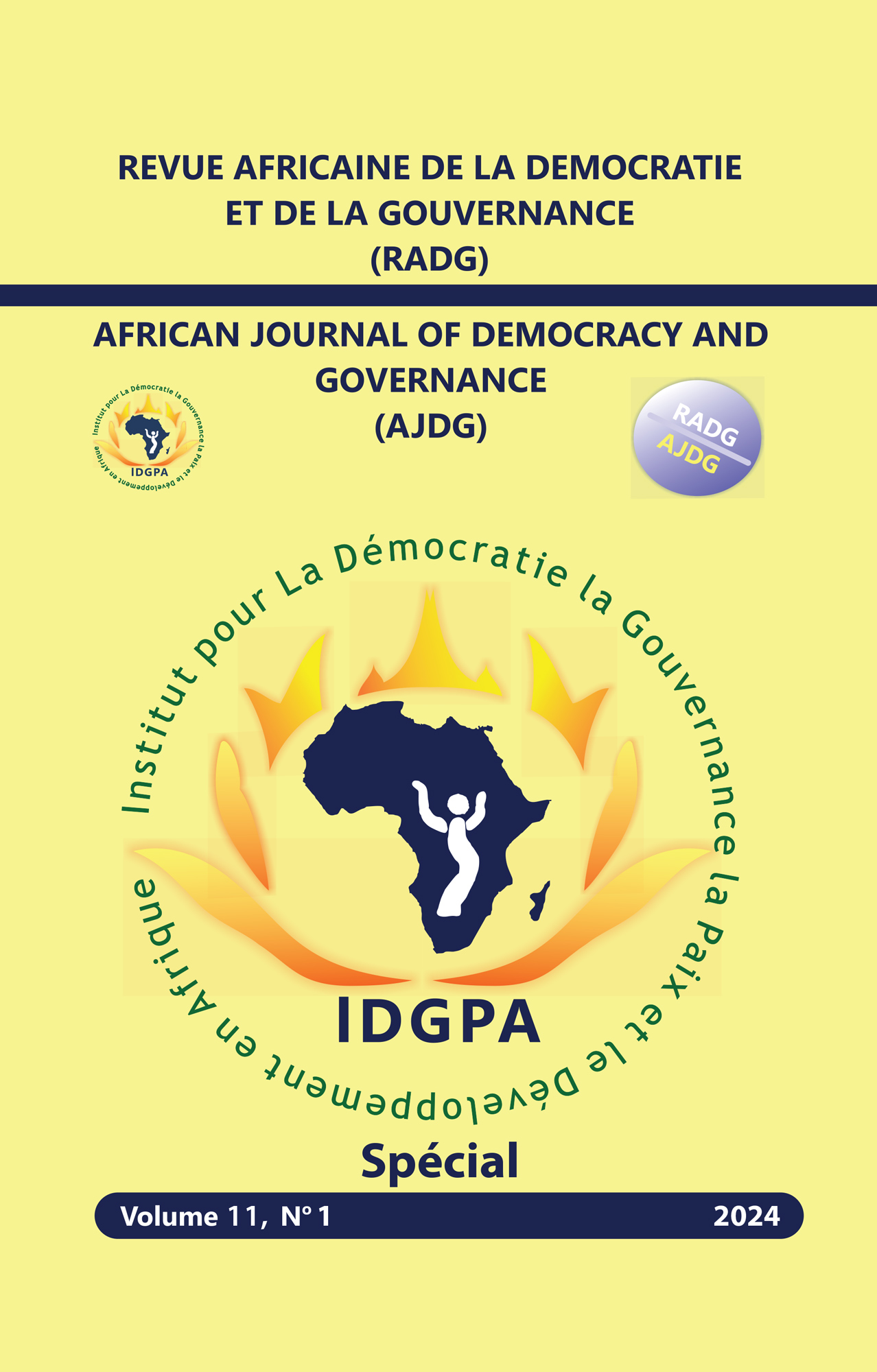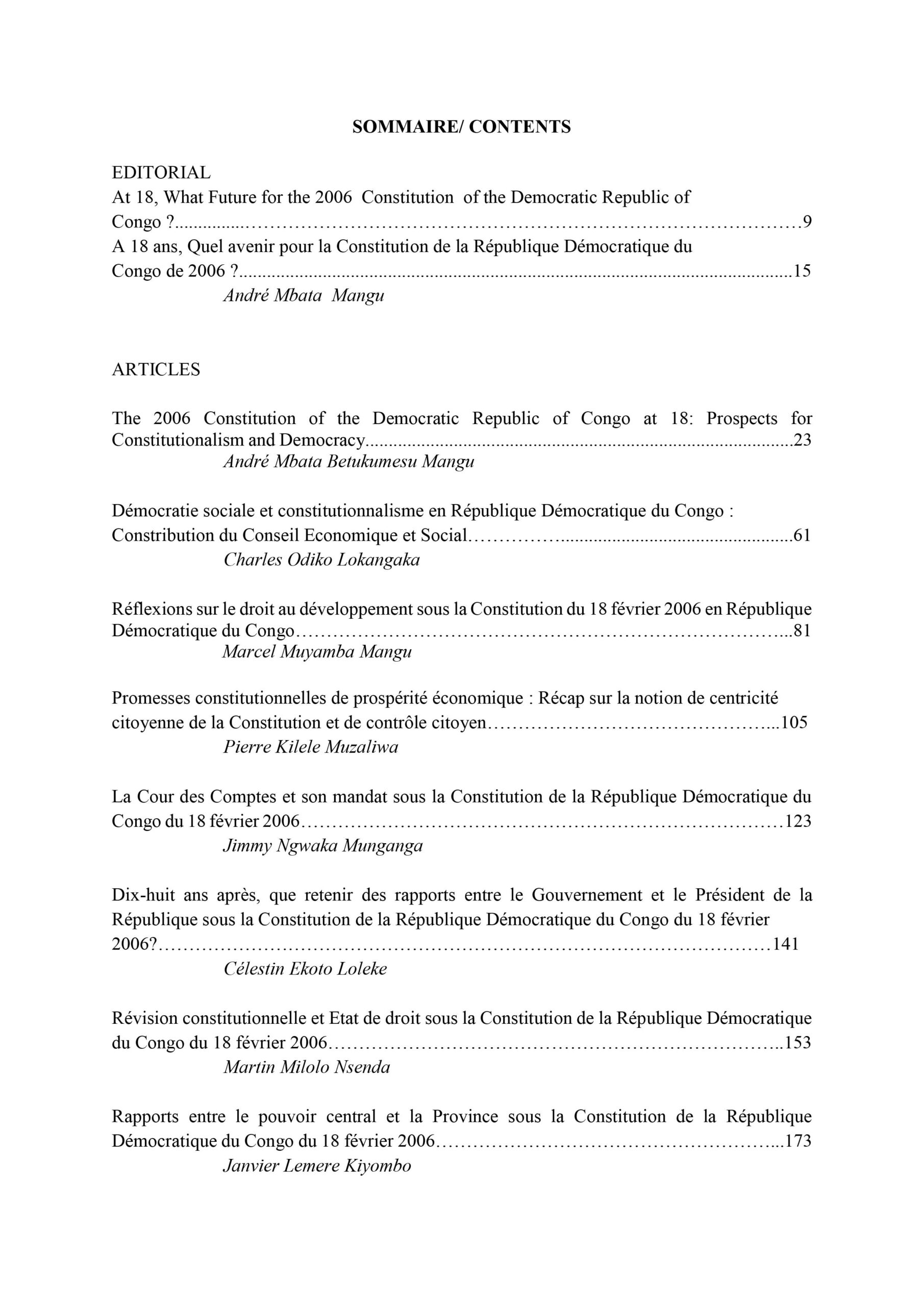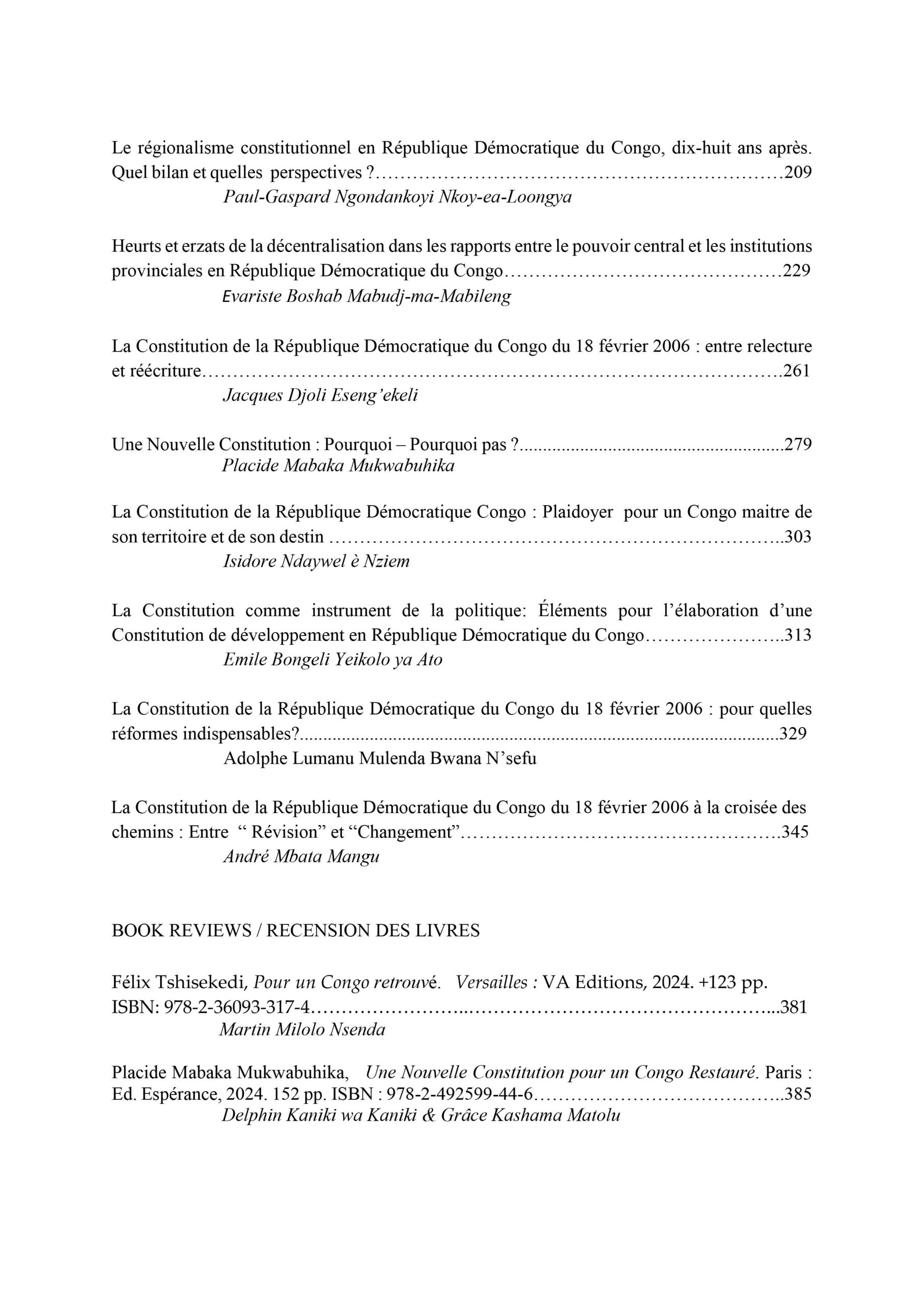Promesses constitutionnelles de prospérité économique : Récap sur les notions de centricité citoyenne et de contrôle citoyen dans la Constitution
$ 10,00
Pierre Kilele Muzaliwa, Professeur associé, Faculté de Droit, Université de Goma, République Démocratique du Congo
Abstract
This paper supports that the Constitution of the Democratic Republic of Congo did not solely trust institutional actors with the realisation of the collective well-being. Alongside, it crafted a mechanism (contrôle citoyen économique) through which citizens can exert control over the management of public economic and financial resources, thus sharing the burden of assuring prosperity between them and the authorities. Notwithstanding this, the population still holds authorities solely responsible for the country’s underperformance. In turn, institutional actors regret the lack of support from citizens not very bold and who expect almost everything from the State. The Constitution established a dual approach of accountability for both involved parties. Beyond what looks apparent, this paper navigates the underlying justifications of the disempowerment of citizens. Through an etiological approach, it submits that the limits to the exercise of citizen’s economic control are to be found in the defect of the constitutional system, which is not citizen-centric as citizens almost have no access to indispensable information. It suggests that the right of access to information should be rewritten in the light of the Kenyan and South African Constitutions. It is only by so doing that citizens will truly be responsible as well of any underperformance by authorities.
Résumé
Cette analyse soutient que la Constitution de la République Démocratique du Congo n’a pas fait exclusivement confiance aux animateurs étatiques pour réaliser le bien-être collectif. A côté, elle a mis en place un mécanisme de responsabilisation du citoyen, partageant ainsi le fardeau de prospérité entre les citoyens et ses dirigeants. Nonobstant cela, la population prend les animateurs étatiques pour seuls responsables du sous-développement du pays. Ceux-ci en retour regrettent l’absence d’accompagnement des citoyens très peu hardis et qui attendent quasiment tout de l’Etat. Alors que la Constitution a reconnu une dualité de responsabilisation aussi bien d’animateurs institutionnels que des citoyens, à travers le contrôle citoyen économique ; cette étude, au-delà des façades, analyse les justifications sous-jacentes de la déresponsabilisation du citoyen. À travers une vue étiologique, elle trouve les limites à l’exercice de ce contrôle dans la défectuosité du dispositif constitutionnel en place : l’accès à l’information. Elle en déduit un faible degré de centricité citoyenne de la Constitution et propose un remodelage du droit d’accès à l’information, à l’aune des Constitutions kenyane et sud-africaine. Cela permettra au citoyen d’être véritablement responsable en prenant part à la gestion des ressources financières et économiques de l’Etat.
Description
Kilele Muzaliwa, P. « Promesses constitutionnelles de prospérité économique : Récap sur les notions de centricité citoyenne et de contrôle citoyen dans la Constitution », African Journal of Democracy and Governance, Vol 11, No 1, 2024, pp 105-122
Pierre Kilele Muzaliwa, Professeur associé, Faculté de Droit, Université de Goma, République Démocratique du Congo
Abstract
This paper supports that the Constitution of the Democratic Republic of Congo did not solely trust institutional actors with the realisation of the collective well-being. Alongside, it crafted a mechanism (contrôle citoyen économique) through which citizens can exert control over the management of public economic and financial resources, thus sharing the burden of assuring prosperity between them and the authorities. Notwithstanding this, the population still holds authorities solely responsible for the country’s underperformance. In turn, institutional actors regret the lack of support from citizens not very bold and who expect almost everything from the State. The Constitution established a dual approach of accountability for both involved parties. Beyond what looks apparent, this paper navigates the underlying justifications of the disempowerment of citizens. Through an etiological approach, it submits that the limits to the exercise of citizen’s economic control are to be found in the defect of the constitutional system, which is not citizen-centric as citizens almost have no access to indispensable information. It suggests that the right of access to information should be rewritten in the light of the Kenyan and South African Constitutions. It is only by so doing that citizens will truly be responsible as well of any underperformance by authorities.
Résumé
Cette analyse soutient que la Constitution de la République Démocratique du Congo n’a pas fait exclusivement confiance aux animateurs étatiques pour réaliser le bien-être collectif. A côté, elle a mis en place un mécanisme de responsabilisation du citoyen, partageant ainsi le fardeau de prospérité entre les citoyens et ses dirigeants. Nonobstant cela, la population prend les animateurs étatiques pour seuls responsables du sous-développement du pays. Ceux-ci en retour regrettent l’absence d’accompagnement des citoyens très peu hardis et qui attendent quasiment tout de l’Etat. Alors que la Constitution a reconnu une dualité de responsabilisation aussi bien d’animateurs institutionnels que des citoyens, à travers le contrôle citoyen économique ; cette étude, au-delà des façades, analyse les justifications sous-jacentes de la déresponsabilisation du citoyen. À travers une vue étiologique, elle trouve les limites à l’exercice de ce contrôle dans la défectuosité du dispositif constitutionnel en place : l’accès à l’information. Elle en déduit un faible degré de centricité citoyenne de la Constitution et propose un remodelage du droit d’accès à l’information, à l’aune des Constitutions kenyane et sud-africaine. Cela permettra au citoyen d’être véritablement responsable en prenant part à la gestion des ressources financières et économiques de l’Etat.
Mots-clés : Constitution de la RDC ; Contrôle citoyen Economique ; Centricité citoyenne ; Droit d’accès à l’information
Seuls les clients connectés ayant acheté ce produit ont la possibilité de laisser un avis.




Avis
Il n’y a pas encore d’avis.